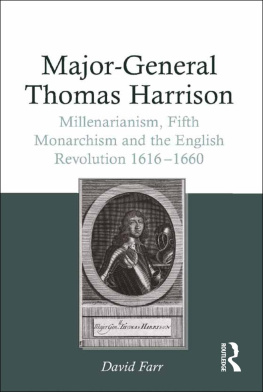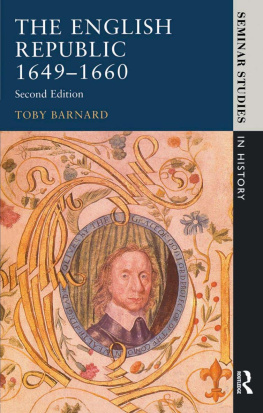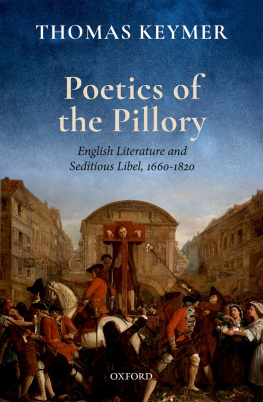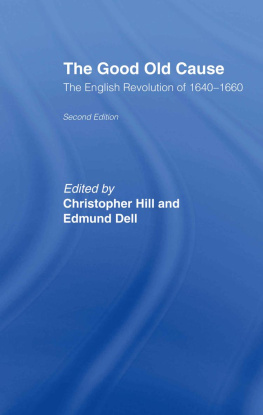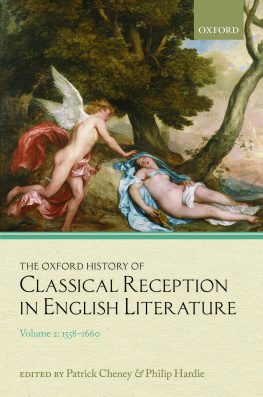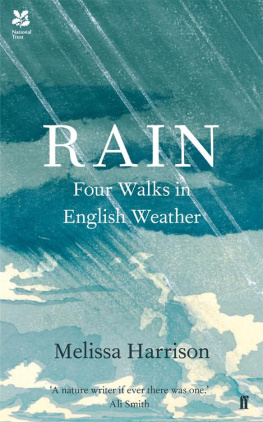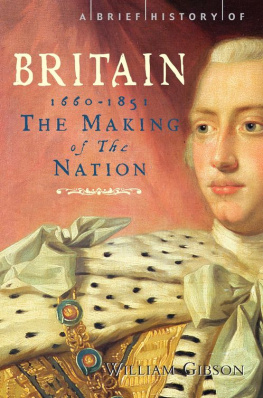MAJOR-GENERAL THOMAS HARRISON
To Fern
with all my love
Major-General Thomas Harrison
Millenarianism, Fifth Monarchism
and the English Revolution 16161660
DAVID FARR
Norwich School, UK
First published 2014 by Ashgate Publishing
Published 2016 by Routledge
2 Park Square, Milton Park, Abingdon, Oxon OX14 4RN
711 Third Avenue, New York, NY 10017, USA
Routledge is an imprint of the Taylor & Francis Group, an informa business
Copyright David Farr 2014
David Farr has asserted his right under the Copyright, Designs and Patents Act, 1988, to be identified as the author of this work.
All rights reserved. No part of this book may be reprinted or reproduced or utilised in any form or by any electronic, mechanical, or other means, now known or hereafter invented, including photocopying and recording, or in any information storage or retrieval system, without permission in writing from the publishers.
Notice:
Product or corporate names may be trademarks or registered trademarks, and are used only for identification and explanation without intent to infringe.
British Library Cataloguing in Publication Data
A catalogue record for this book is available from the British Library
The Library of Congress has cataloged the printed edition as follows:
Farr, David, 1969 January 22
Major-General Thomas Harrison : millenarianism, fifth monarchism and the English
Revolution 16161660 / by David Farr.
pages cm
Includes bibliographical references and index.
1. Harrison, Thomas, 16061660. 2. Great Britain History Commonwealth and Protectorate, 16491660 Biography. 3. Great Britain Politics and government 16421660. 4. Generals Great Britain Biography
I. Title.
DA407.H37F37 2014
942.062092dc23
[B]
2013019351
ISBN 9781409465546 (hbk)
ISBN 9781315593227 (ebk-PDF)
ISBN 9781317102663 (ebk-ePUB)
List of Tables
Abbreviations
BL | British Library. |
Capp, FM | Capp, B., The Fifth Monarchy Men, (London, 1972). |
CCC | Calendar of the Committee for Compounding, 164360, ed. M.A.E. Green (5 vols, HMSO, London, 188992). |
CJ | Journals of the House of Commons. |
Clarke Papers | Firth, C.H. (ed.), The Clarke Papers, (Woodbridge, vols 1 and 2, 1992). |
CSPD | Calendar Of State Papers Domestic Series. |
Gentles, NMA | Gentles, I., The New Model Army in England, Ireland and Scotland 16451653 (Oxford, 1992). |
HMC | Historical Manuscripts Commission Reports. |
Lilburne, LFL | Lilburne, J., Legal and Fundamentall Liberties of the people of England (18 June, 1649). |
LJ | Journals of the House of Lords. |
LMA | London Metropolitan Archives |
Ludlow, Memoirs | Firth, C.H. (ed.), Ludlows Memoirs, 2 vols (Oxford, 1894). |
Mayer, Inedited Letters | Mayer, J. (ed.), Inedited Letters of Cromwell, Colonel Jones, Bradshaw, and other regicides, Transactions of the Historic Society of Lancashire and Cheshire, XIII (1861). |
New DNB | Oxford Dictionary of National Biography. |
State Trials | Howell, T.B. (ed.), Cobbetts Complete Collection of State Trials, 33 vols, V, (180910). |
TNA | The National Archives (Public Record Office), Kew |
TSP | Birch, T. (ed.), Thurloe State Papers (7 vols, London, 1742). |
Underdown, Prides Purge | Underdown, D., Prides Purge (Oxford, 1971). |
Woolrych, CP | Woolrych, A., Commonwealth to Protectorate (Oxford, 1982). |
Worden, Rump Parliament | Worden, B., The Rump Parliament (Cambridge, 1974). |
Acknowledgements
I would like to thank Jason Peacey and David Smith for their encouragement to pursue a study of Harrison. Ariel Hessayson and David Finegan offered typically perceptive comments on early drafts of what has become . I would particularly like to thank Alan Marshall for allowing me to use a copy of the paper he delivered at Selwyn College, Cambridge, on the trial of Harrison. Norah Carlin generously allowed me to make use of her article on army petitions when writing an earlier study of Henry Ireton and it has again proved useful. In terms of broader intellectual gratitude, the footnotes indicate the work of numerous others that have contributed to this work. Clearly prominent among them is John Morrill, although my indebtedness to him extends well beyond what can be contained in the text.
This work has relied on the assistance of numerous archivists. Carowyn Samuel and Michael Jones at the National Library of Wales, Aberystwyth, and the staff of Cambridge University Library, Lambeth Palace Library, London Metropolitan Archives, the British Library and particularly Jovita Callveng, the Bodleian, the National Archives, the National Portrait Gallery and the Norfolk Record Office have all done much to contribute to this text. I would also like to thank Tania Pendreich and Rebecca Lawrence for their research and palaeographic skills in tracking down Norfolk Fifth Monarchists in the archives. I am especially grateful to Beatrice Beaup and Tom Gray at Ashgate for their support, skills and efficiency.
It is to my family to whom I owe the most, from the unconditional support of my parents to Fern, Arthur and Henrys patient acceptance of various early modern characters in their home.
Introduction
In 1660, Thomas Harrison was selected as the surviving regicide to be first put on trial and publicly executed. Also of note is the amount of material produced in 1660, first to reinforce the example the state wanted set by their revenge on Harrison, but then in response by those who sought to defend Harrisons reputation and the act of regicide. Harrisons prominence in 1660 derived from him being an obvious symbol of the revolutionary years. A man from a relatively obscure background, influenced by his time spent in London before 1642, on the fringes of merchant and lawyer networks, Harrison was radicalised by his experience in the armies of the Eastern Association and New Model to emerge as an extreme millenarian at the centre of the armys revolution of 164749 and the developing Fifth Monarchist movement to late 1653.
Of the 59 regicides, Harrison ranks, after Cromwell and Henry Ireton, as a key individual in the process that brought Charles I to his execution. Harrison publicly denounced the king as that man of blood as early as November 1647, escorted Charles I to London for his trial and undertook much of the practical work needed to ensure the regicide passed as efficiently as possible. Behind these public practical actions, glimpses can be seen of Harrisons influence in the decision that not only did Charles I deserve to die but that the army leaders had no choice but to execute him. Harrison, through prayer meetings, smaller support groups and intimate discussions with Cromwell and Ireton, helped shape the regicide.

